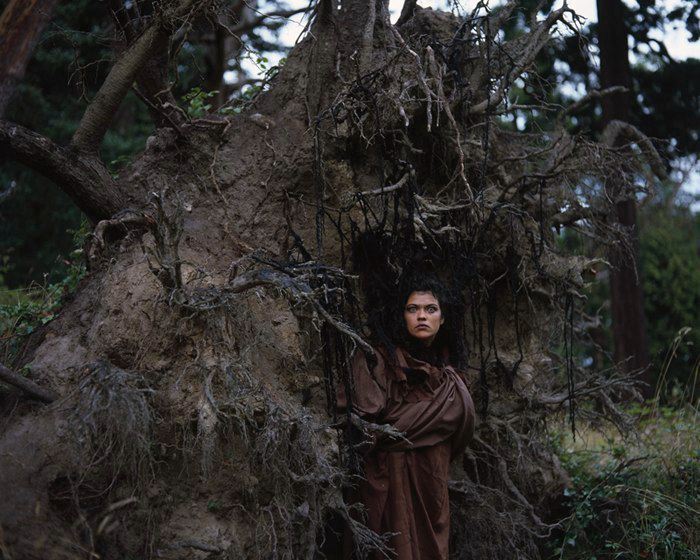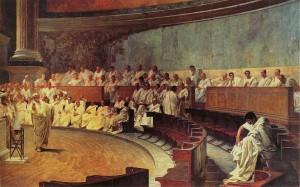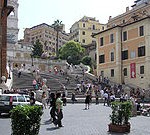This is exactly what was never supposed to happen. This is the breaking of the devil’s deal the Oregon Legislature made to keep the culture lobby off its back.
This is what happens when an entire state thinks that “fiscal responsibility” means tax kickback checks to citizens in flush times, $10 corporate income taxes in all times, trying to balance the state budget on a two-legged stool (property and income taxes, but no sales tax to keep the stool from tipping over), and a pig-headed refusal to recognize — in Oregon, of all places — that you need to plan for a rainy day.
Don’t look now, but it’s pouring.
And that’s why the Oregon Legislature, trying desperately to fill the gigantic hole in the state’s budget, is cribbing money from every place possible — including the Oregon Cultural Trust, as we reported in this earlier story and as political writer Harry Esteve explains in this morning’s Oregonian.
Let me be clear: I don’t blame the Legislature for looking at every penny available from every source as it tries to deal with this fiscal crisis. It’s a no-win proposition: No matter what our legislators do, on some level it will be wrong. This is a debacle made partly at the national and international levels, and partly by Oregon’s long history of pretending it can have a little bit of everything in life without having to pay for most of it. Now the piper’s at the door, demanding to be paid. And it’s the Legislature that has to figure out how to do it.
What’s depressing is that we’ve been down this road before. And the Oregon Cultural Trust was set up to ensure that in the toughest of times — which once again, we seem to be entering — vital cultural projects and organizations won’t be cut off at the root.
The deal the Legislature made on the Trust when it passed enabling legislation in 2001 was essentially this: Culture in Oregon will be pay-as-you-go, but we’ll help. We’ll establish a small beginning balance, we’ll sell cultural license plates to help fund the Trust, we’ll provide a nice tax break for contributions to cultural groups, and we’ll administer the thing. And then, please, leave us alone.
What that means is that every cent from cultural license plates and donations to the Trust has come into the state coffers with a clear, specific and supposedly inviolable earmark. The money was given for cultural purposes and no others. Using it for any other purpose is a moral violation of trust, and probably a legal violation as well: There is long legal precedence in the United States in favor of donor intentions.
Picking the Cultural Trust pocket, even in times of extraordinary fiscal crisis, is foolish in the long run in three ways.
First, once burned, twice shy. Why would anyone donate to the Trust again once it’s been made clear that the state can and will take the money and use it for something else? That precedent surely will strangle the Trust and cripple or even kill it.
Second, this can’t be legal. If the Legislature ends up appropriating this $2 million-odd for other purposes, it almost certainly will be slapped with a lawsuit. And how much will it cost for the state to defend a suit it will probably lose?
Third, who you gonna trust? Not the Legislature, which has broken its word. Not the governor, who says it’s OK. The erosion of public trust in government is a problem with serious consequences for democracy — as trust goes down, more and more people simply tune out, choosing not to take part in the political process at all. For government, trust — even trust shaded with skepticism — is vital. Break it and you’ve broken yourself.
For some background on the beginnings of the Oregon Cultural Trust, on how we got to this point, and on how frustratingly familiar today’s “news” sounds, read on:
Continue reading In the Oregon Legislature, a matter of broken Trust →
 So, yes, it’s taken some time for me to figure out how to occupy space at both Art Scatter and Portland Arts Watch, not that you were holding your breath or anything.
So, yes, it’s taken some time for me to figure out how to occupy space at both Art Scatter and Portland Arts Watch, not that you were holding your breath or anything.  “What do you think of semiotics?” an owlish interrogator asked me.
“What do you think of semiotics?” an owlish interrogator asked me.
 Neil Simon, American comedian: Also from Monday’s Oregonian (the full review ran online; a shortened version ran in print) is
Neil Simon, American comedian: Also from Monday’s Oregonian (the full review ran online; a shortened version ran in print) is 
 Like her fellow Oregon state legislators, Carter — chief of the Senate’s budget committee — is stuck in a politicians’ nightmare. The economic catastrophe has forced her and her colleagues to make deep budgetary cuts guaranteed to prompt howls of anguish and cries for their heads. Nobody knows exactly where this thing’s going, but the best guess is that before cuts the state budget hole is $855 million right now and will be $3 billion for the 2009-11 cycle. That’s a lot of enchiladas. Legislators face the distressing challenge of dealing with a situation that has no good solutions: Whatever they do, on some level it’s going to be wrong.
Like her fellow Oregon state legislators, Carter — chief of the Senate’s budget committee — is stuck in a politicians’ nightmare. The economic catastrophe has forced her and her colleagues to make deep budgetary cuts guaranteed to prompt howls of anguish and cries for their heads. Nobody knows exactly where this thing’s going, but the best guess is that before cuts the state budget hole is $855 million right now and will be $3 billion for the 2009-11 cycle. That’s a lot of enchiladas. Legislators face the distressing challenge of dealing with a situation that has no good solutions: Whatever they do, on some level it’s going to be wrong. Over at
Over at 
 After the dust settles, the tsunami recedes or the cookie crumbles, depending on your metaphor of choice for our present economic condition, who will be left standing? More specifically, what regions of the country can expect to rebound quickly and which ones are headed for even deeper trouble?
After the dust settles, the tsunami recedes or the cookie crumbles, depending on your metaphor of choice for our present economic condition, who will be left standing? More specifically, what regions of the country can expect to rebound quickly and which ones are headed for even deeper trouble?  Things are looking bad, folks. Most egregious is the Legislature’s attempt to liberate $1.8 million from the permanent fund of the
Things are looking bad, folks. Most egregious is the Legislature’s attempt to liberate $1.8 million from the permanent fund of the 
 Cousin Rick, a far-flung Scatter-friend, writes from Paris. Writes! On writing paper, with hand-formed, fully-formed letters and elegant sentences. Like tooled leather, it seems to me.
Cousin Rick, a far-flung Scatter-friend, writes from Paris. Writes! On writing paper, with hand-formed, fully-formed letters and elegant sentences. Like tooled leather, it seems to me.